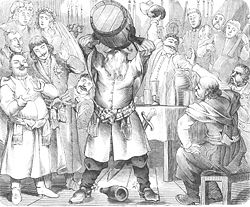After an astounding success of threads like
What do Poles owe to Chechs?
What do Poles owe to Jews?
and many other,
it is time to start the dearest to many Polish hearts: about traditional Polish Hungarian ties/bonds!
The first (correct me if I am wrong) Hungarian contribution for Poland was Queen Jadwiga, today a saint and a patron of many churches, schools and other institutions.
en.wikipedia.org/wiki/Jadwiga_of_Poland
.jpg)
Saint Jadwiga Technical High School, the celebration of the patron`s day:
One of the best Polish king was Stefan Batory from Hungary:
Stephen completely reorganized the Polish Army. Among his genuine inventions was the piechota wybraniecka semi-professional infantry formation, composed of peasants trained in both infantry warfare and engineering. Stephen also reorganised the judiciary by formation of legal tribunals. He also founded the Academy of Vilna, the third university in the Commonwealth and a predecessor of the modern Vilnius University.
What do Poles owe to Chechs?
What do Poles owe to Jews?
and many other,
it is time to start the dearest to many Polish hearts: about traditional Polish Hungarian ties/bonds!
The first (correct me if I am wrong) Hungarian contribution for Poland was Queen Jadwiga, today a saint and a patron of many churches, schools and other institutions.
Jadwiga (Polish pronunciation: [jadˈviɡa]; 1373/4 - 17 July 1399) was monarch of Poland from 1384 to her death. Her official title was 'king' rather than 'queen', reflecting that she was a sovereign in her own right and not merely a royal consort. She was a member of the Capetian House of Anjou, the daughter of King Louis I of Hungary and Elizabeth of Bosnia.[2] She is known in Polish as Jadwiga, in English and German as Hedwig, in Lithuanian as Jadvyga, in Hungarian as Hedvig, and in Latin as Hedvigis.
en.wikipedia.org/wiki/Jadwiga_of_Poland
.jpg)
Saint Jadwiga Technical High School, the celebration of the patron`s day:
One of the best Polish king was Stefan Batory from Hungary:
Stephen completely reorganized the Polish Army. Among his genuine inventions was the piechota wybraniecka semi-professional infantry formation, composed of peasants trained in both infantry warfare and engineering. Stephen also reorganised the judiciary by formation of legal tribunals. He also founded the Academy of Vilna, the third university in the Commonwealth and a predecessor of the modern Vilnius University.



